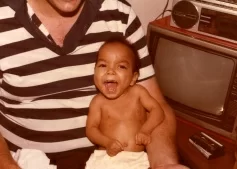 without a thought on my part. But Luke came to my mind yesterday and I looked up some information on him and discovered that his birthday had just passed. I found this old article that I wrote about Luke a few years ago. I thought I'd share it again. I am convinced that there are important and significant lessons we can learn from his life, and that I need to regularly share what I think they are. I hope you enjoy this!
without a thought on my part. But Luke came to my mind yesterday and I looked up some information on him and discovered that his birthday had just passed. I found this old article that I wrote about Luke a few years ago. I thought I'd share it again. I am convinced that there are important and significant lessons we can learn from his life, and that I need to regularly share what I think they are. I hope you enjoy this!The mysteries of God are a part of the Christian life that can often lead to confusion, doubt and even discouragement for believers.
- For some, it's a pride thing. We want to have answers – we want to understand, to be able to grasp the complexities of Biblical truth and God's plan for mankind.
- For some, God's mysteries – the unexplained things of life – are stumbling blocks to faith:
1. Why do bad things happen to good people?
2. Why does He allow pain, suffering and evil to thrive in our world?
Several months ago we were witnesses to the aftermath of the tragedy in Pennsylvania involving the Amish community, where, good, decent, hard working, non violent people were subjected to unspeakable cruelty towards their children. How can this happen?
3. One of our CSC children, who grew up in the worst poverty imaginable in Cebu City, was adopted into a family in the United States several years ago. Well meaning people would tell her how lucky she was and how God obviously had a wonderful plan for her life. She had a hard time with that and would sometimes ask her parents, "But what about all the kids who are still there, who weren't adopted, and who are still suffering and dying? What is God's wonderful plan for their lives? Why me and not them?
For many of us, we celebrate the goodness of God in our lives, we praise him for his healing, for material comforts, for blessing our efforts – even as we observe people who remain sick or disabled, who suffer in poverty – those who efforts and initiatives end in disappointment and ruin.
There are two extremes in terms of people's reactions to the things about God and life that are not understood.
1. There are those who try in vain to grasp the ungraspable – to be able to reduce the mysteries to understandable formulas or explanations. I remember a young seminarian who came to Cebu and who filled the pulpit of our church on a Sunday evening. He preached for an hour on the "peace of God that passes all understanding." Perhaps he felt that if he preached long enough he could crack that nut and open our understanding!
We all know those who have reduced the book of Revelation to precise charts and timetables, giving us easy to understand categories for all of human history and, most especially, the times to come.
2. A second category are those who shake their heads and say, "We'll only know these answers when we get to heaven." They suspend inquiry, not bothering to seek answers to the perplexing questions of life.
Living and working in a Third World country like the Philippines brings some of these mysteries to the front of our lives. Poverty, and all that goes with it, is "in your face." People often ask me "How do you like living in the Philippines?" That's a tough one to answer. Life anywhere has its highs and lows. Some days are great, others are difficult. I often answer this way:
1. When I'm sitting down to a nice breakfast I am aware that, within a few meters of my house are families that have no breakfast.
2. When I'm driving to the office or the Shelter I often pass people walking along the road who, for lack of a few cents can not even afford public transportation and must walk.
3. When I stop to buy medicine for my family or the CSC kids, there are people standing nearby whose children are dying for lack of that very same medicine.
Why am I blessed and they are not?
I recall a conversation with a missionary a few days after Cebu was hit by a strong typhoon. Many of our CSC workers lost their roofs or their entire homes. The houses of the poor were devastated by the high winds and torrential rains. The missionary said that it had been such a miracle how God spared the missionary homes from damage, holding his hands of protection around us during the storm. I remember wondering whether it wasn't more a matter of our having cement houses and strong metal roofs.
Why did our CSC kids have to suffer so much? And how much more, those who live on the street and cannot be admitted to CSC?
These are tough questions. When it comes to trying to understand our own suffering, the Bible gives some answers. For example, Romans 5:3-4 tells us that suffering produces perseverance, perseverance character, and character, hope. And the Bible gives us additional hope that we will someday come to see God's purpose and mysteries:
"But now we see through a glass dimly, but then face to face."
And we hear the testimonies of Christian brothers and sisters who have lived through terrible times and have turned negatives into positives in their lives.
Several months ago I was attending a conference in Bismark, North Dakota. One of the featured speakers was Steve Saint, Steve's father, Nate Saint, was one of the five missionaries killed in 1956 by Aucan warriors in Equador. Steve told about what that tragic day meant to his family, and what it was like when his dad, his hero, didn't come home that day. We saw video of his current family life, and saw a man who was interacting with Steve's children, and who was being referred to as "Uncle." It turns out that this was the very man who had killed Steve's father, who had come to know Jesus and had experienced the forgiveness of God and of the Saint family and now was a part of their family – an amazing story of how good things had come out of tragedy and suffering.
So the clear message is that God has a plan for our lives, we will discover that plan in the right time. He is writing our life's stories, but some of the chapters are difficult ones.
We can understand this. We can, when aided by the Holy Spirit, see how difficulties and suffering are part of a purification process for us, and that we, like Job, will eventually be better people for it.
But what about people who, because of major disabilities, are unable to understand their situation, unable to discern the hand of God or his plan for their lives. Where is the purification and growth and ultimate value for these people? What could God's purpose possibly be?
Back on 1982 a baby was born in a charity ward in a small hospital in Cebu City. 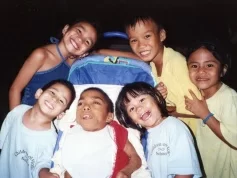 The baby underwent cardiac arrest during birth and was without oxygen for an extended time. Unlike many cases of charity patients, the hospital staff decided to resuscitate the baby, even after he had suffered massive brain damage and cerebral palsy. The baby's mother abandoned him in the hospital, and after a couple months Luke was referred to CSC. When we took him in he appeared to be a bouncing baby boy. We did not know that he would not develop physically beyond about a year and a half, or mentally beyond a few months. Luke would never speak, nor have voluntary movement of his arms or legs.
The baby underwent cardiac arrest during birth and was without oxygen for an extended time. Unlike many cases of charity patients, the hospital staff decided to resuscitate the baby, even after he had suffered massive brain damage and cerebral palsy. The baby's mother abandoned him in the hospital, and after a couple months Luke was referred to CSC. When we took him in he appeared to be a bouncing baby boy. We did not know that he would not develop physically beyond about a year and a half, or mentally beyond a few months. Luke would never speak, nor have voluntary movement of his arms or legs.
Luke became a fixture at CSC. For over 23 years he was an integral part of our lives and a symbol of CSC and what we are all about.
Many times Luke would be hospitalized – often due to upper respiratory infections. He fought for his life many times. There were at least a dozen times when we were sure that he would die. The doctors had told us that he wouldn't make it past five years old. Then they revised it to nine, then 11 – certainly he wouldn't reach his teenage years.
One time, when Luke was critically ill our staff met to pray and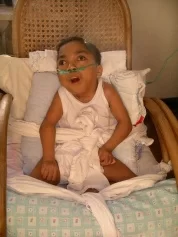 I asked them to reflect on his life. Here is why: I believe that God had a purpose for Luke's life when he created him. I believe that He uses people like Luke to teach us important things. But here is the rub: If we don't spend time reflecting on these lessons, then Luke's life is useless. Its up to us to allow God to make sense of Luke's life.
I asked them to reflect on his life. Here is why: I believe that God had a purpose for Luke's life when he created him. I believe that He uses people like Luke to teach us important things. But here is the rub: If we don't spend time reflecting on these lessons, then Luke's life is useless. Its up to us to allow God to make sense of Luke's life.
And what are the lessons that we found? What has God taught us through his life?
1. First, life is precious. Even though he had nothing to live for, from the world's point of view, Luke clung to live almost ferociously. Some of us who have much more to live for take life casually, we take life for granted. Not Luke. Every day was a struggle. Every breath had to be fought for. Life is a gift from God and we should treat it carefully.
2. God has provided us with opportunities, through Luke's life, to minister to him in significant and life-saving ways. He has provided an avenue for us to live out the biblical mandate to minister unto the "least of these," because, truly, Luke was in that category. Hundreds of people have been given a blessing to participate in the support of CSC that reaches out to children like Luke and many others with other special needs.
3. In so doing, He has given us a chance to show others a Godly value system that doesn't reserve love and attention for those who have something to give back, or who have "potential" or a bright future. For many people who live in a developing country, where resources are limited, this has been a difficult lesson to learn. How could we justify spending so much money for Luke's hospitalization when other, "normal" kids needed care? Luke's life gave us the opportunity to teach about the value of life and about how God looks at all of us.
4. Luke has been a tremendous ambassador for CSC. People around the world remember observing the loving care that he received by our staff and workers. They remember his famous smiles. They may quickly forget the names of the staff or other children, but they remember Luke. "How's Luke doing?" we get asked wherever we go to talk about the ministry of CSC. And our care of Luke helps us explain the true nature and core values of our work in the Philippines.
5. Luke has been a safety valve for those that had an opportunity to know him. My job as Field Director of CSC involves lots of administrative chores, like making budgets, government relations and various kinds of problem solving. There are days when I get stressed out and start to feel the weight of the world on my shoulders. But all I needed to do is to drive a few short miles to where Luke lived, to hold him in my arms, and I get a clear picture of what real struggles are all about. My struggles paled in comparison to what Luke faced every day. Self pity may be easy for some people, but those that knew Luke have no excuse for feeling sorry for themselves. What a great gift that was to all of us.
A little over a week before we left Cebu, Marlys called me on my cell phone and told me that I should get to the hospital quickly, as Luke wasn't doing well. He had been hospitalized for over a week and his breathing was bad. I had gotten messages similar to this one throughout Luke's life, so I went to the office and took care of a few things. But the Lord laid it on my heart to go see Luke and when I entered his room his breathing was extremely labored. He looked different than I had ever seen him, and it became clear that he was dying. I sat down next to him, kissed him and looked into his eyes. For 23 years we had loved this boy. It wasn't easy to say goodbye. I said to him, "Luke. You can go. Go to be with Jesus, Luke. I love you." Within a couple of minutes Luke took his last breath. 23 years of pain, suffering, limitations, hospitalizations, forced breathing, skin rashes and infections were over. We would never see Luke's smile again.
As Luke was dying in that hospital room, I made a promise. I'm not sure if I was making a promise to Luke, to God or to myself. But I decided then and there that I was going to talk about Luke on our coming furlough. I believed then and do now, that the church of Jesus Christ needs to hear about Luke, that the lessons of his life are important ones. Many Americans are complainers - full of self pity. People who have so many material comforts are unsatisfied. American discourse is increasingly a chorus of victim and entitlement claims. Charles Sykes, in his book "A Nation of Victims: The Decay of the American Character" states that, "in a nation where everyone is a victim, no one is a victim." In our preoccupation with our own needs we have a hard time seeing the needs of others – people like Luke.
In his song "God Help the Outcasts," the Hunchback of Notre Dame poses several difficult issues:
I don't know if there's a reason
Why some are blessed, some not
Why the few You seem to favor
They fear us, flee us,
Try not to see us.
The first part we have already examined. The second is our call to arms. "Why the few You seem to favor, they fear us, flee us, try not to see us."
I don't know what factors might make it difficult for us to see the needs of society's outcasts. Perhaps we are too busy. Maybe our personal and church calendars are so full that there just isn't room for Luke, or the man who had fallen to thieves at the side of the road, to break into our day. Maybe we are numbed or fatigued by the needs of others, or simply overwhelmed by the circumstances of our own lives. Maybe we have become cynical. "Why did that guy travel this road at this time carrying that amount of money? He deserves what he got!"
Maybe, just maybe, Luke can help cut through the apathy, the self-centeredness and cynicism of our lives. He was a person with significant needs that he didn't cause. He was totally dependent on others to live. His life had none of the possibilities and opportunities that we take for granted every day. He needed us so very much. Maybe Luke can serve as a symbol of many others that we come into contact with. Maybe Luke can help us rescue our lives.
Little moments that are big!
With all the changes going on at CSC, including changes with our staff, we find ourselves anticipating a question from our friends: Is CSC okay? We are! There are many big reasons, like the talent and commitment of staff, excellent Filipinos moving into Leadership positions, a loyal and generous donor base and a good financial position. But there are lots of little reasons, too. I see them every day at the Shelter if I keep my eyes open to them. They are acts of love and care done by our workers to the CSC kids, people who sometimes get overlooked when we tally up our assets as a ministry.
 The other night I was "on duty" at the Eicher Home. Staff take turns hanging out in one of the homes when the house parents are off. We were playing a bowling game with plastic pins and ball. Wilmar, who has special needs and really loves bowling, was doing very well. He has the most unorthodox, twisting, flailing technique you could imagine, but he was somehow getting the pins down. To say the least, he was very excited by his success. The child care worker who shadows Wilmar both inside and outside the house, was there helping him stay focused and approximate following the rule for sitting down between turns and not getting in the way of others. Wilmar has a personal auntie for most of the day, including mealtimes. His auntie the other night was Christita. It isn't always easy to care for Wilmar, especially at supper time. He would much rather talk, sing, dance, joke and laugh than eat, and he is always the last one to leave the table. Lots of reminders are needed and tons of patience. Christita has that. And she has something more. She loves Wilmar. I noticed her during the
The other night I was "on duty" at the Eicher Home. Staff take turns hanging out in one of the homes when the house parents are off. We were playing a bowling game with plastic pins and ball. Wilmar, who has special needs and really loves bowling, was doing very well. He has the most unorthodox, twisting, flailing technique you could imagine, but he was somehow getting the pins down. To say the least, he was very excited by his success. The child care worker who shadows Wilmar both inside and outside the house, was there helping him stay focused and approximate following the rule for sitting down between turns and not getting in the way of others. Wilmar has a personal auntie for most of the day, including mealtimes. His auntie the other night was Christita. It isn't always easy to care for Wilmar, especially at supper time. He would much rather talk, sing, dance, joke and laugh than eat, and he is always the last one to leave the table. Lots of reminders are needed and tons of patience. Christita has that. And she has something more. She loves Wilmar. I noticed her during the 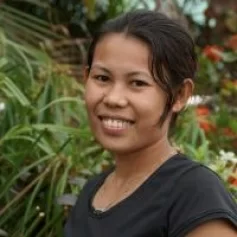 bowling competition, pulling for Wilmar, cheering his success and working to keep him engaged and focused. When he finally won the event I looked at her giving him a hug with a huge smile on her face. She knew how much that moment meant to Wilmar, and she was sharing in his triumph with joy. It was one of those great moments that happen over and over again at CSC. And it reinforced to me that for our workers, like with our staff members, CSC is more than just a job. It is a ministry of building, strengthening, encouraging and glorying in the lives of the children that live here.
bowling competition, pulling for Wilmar, cheering his success and working to keep him engaged and focused. When he finally won the event I looked at her giving him a hug with a huge smile on her face. She knew how much that moment meant to Wilmar, and she was sharing in his triumph with joy. It was one of those great moments that happen over and over again at CSC. And it reinforced to me that for our workers, like with our staff members, CSC is more than just a job. It is a ministry of building, strengthening, encouraging and glorying in the lives of the children that live here.
Eldie Moves up
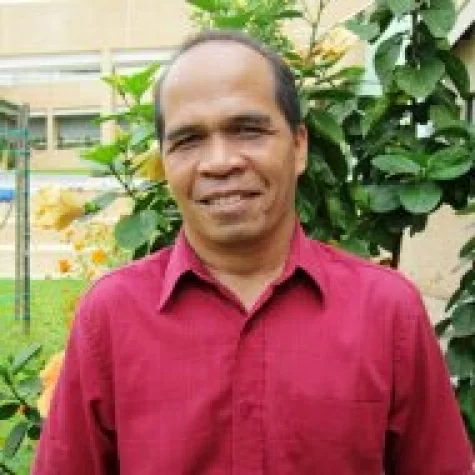 One of the most important changes at CSC these days involves our new Human Resources department and Eldie Allocod. Eldie has been a counselor at CSC for the past seven years, but he will relinquish that position as he takes over the leadership of HR. Eldie worked in the business world before coming to CSC so has a basic understanding of the workings of an HR department and the government requirements for employers. But more importantly, he understands CSC and our employees. He will be great resource for them in terms of compensation, benefits and designing staff development and team building activities. Since CSC has 125 employees that will be a big job. Eldie will soon be hiring an associate to help him in the department.
One of the most important changes at CSC these days involves our new Human Resources department and Eldie Allocod. Eldie has been a counselor at CSC for the past seven years, but he will relinquish that position as he takes over the leadership of HR. Eldie worked in the business world before coming to CSC so has a basic understanding of the workings of an HR department and the government requirements for employers. But more importantly, he understands CSC and our employees. He will be great resource for them in terms of compensation, benefits and designing staff development and team building activities. Since CSC has 125 employees that will be a big job. Eldie will soon be hiring an associate to help him in the department.
Congratulations, Eldie, on this promotion and we look forward to watching this department get established and begin to meet the needs of a growing organization. As Eldie says, happier employees translates to better care for our children. And that is something that we are always looking for at CSC!
Solidarity Fellowship
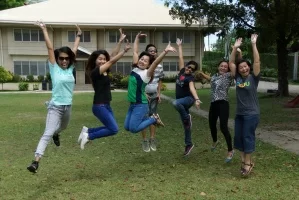 Big and small changes are happening at CSC. Whatever the size is, our arms are wide open in welcoming these changes. Sometimes in our lives "cool change" is needed and same is true for companies and ministries.
Big and small changes are happening at CSC. Whatever the size is, our arms are wide open in welcoming these changes. Sometimes in our lives "cool change" is needed and same is true for companies and ministries.
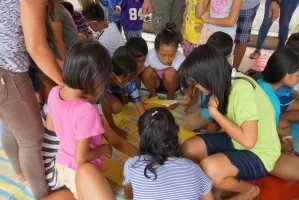
Last year we hired a Social Work Director and hired two more Social Workers to be on staff. This department had a big change with Carmelita Baya's retirement, our long time Social Worker. Just like the rest of the departments at CSC, Social Work has a vital role in the lives of our children. They are in the front row in admitting new CSC children and one of the many hands that prepare the children for adoption.
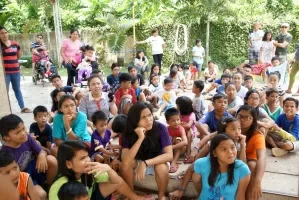
My department, Child Development, and Social Work works hand in hand. Together with the Counselors, our departments meet every month to talk about updates on each child. Our departments needs to be on the same page in writing our reports. Child Development needs to know where the child's paperwork is at and at the same time, Social Work needs to know of any challenges and progress our children meet.
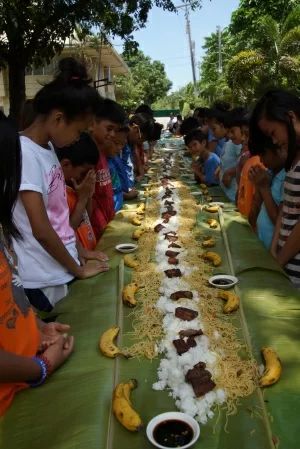
Last April, the two departments held a joint event together with all of our school age kids. The said event was to bring solidarity amongst the children at CSC, solidarity amongst the Child Development and Social Work staff and fellowship amongst the workers and the children. It was an event full of creativity, beaming faces, bible verses and oneness. The children got to know their Social Workers and what an important role they have in their lives.
To show solidarity and to enjoy our fellowship even more, we ended our event with a very good lunch: Boodle Fight! Our houseparents lined up a long line of tables on the driveway; using banana leaves, our cooks laid out rice, pancit and grilled pork on the table and everyone: the children and the CSC workers dig in to a scrumptious lunch using their bare hands!
CCSSC does it again!
So many people work together to make CSC go. Years ago, our friends in Canada put together an organization to help support the ministry in Cebu. The Cebu Children's Shelter Society of Canada was former by people who had lived in Cebu and knew about the work that we were doing. CCSSC is an entirely volunteer-run organization that 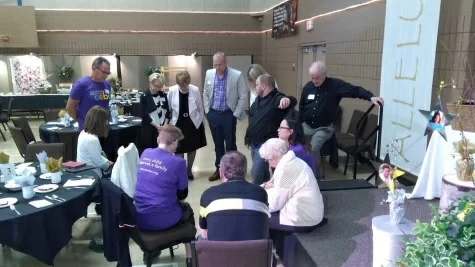 sends all the money that comes in to Cebu for the ministry. Every year they have a banquet and auction as a fund raiser for the ministry. I have had the pleasure of attending a few of these events and have always been amazed at how hard these volunteers work for the sake of our kids here. It is a labor of love, and the labor is significant - planning, soliciting donations, organizing, displaying, decorating, cooking, greeting, cleaning up, counting, receipting. And lots 0f prayer goes into the event.
sends all the money that comes in to Cebu for the ministry. Every year they have a banquet and auction as a fund raiser for the ministry. I have had the pleasure of attending a few of these events and have always been amazed at how hard these volunteers work for the sake of our kids here. It is a labor of love, and the labor is significant - planning, soliciting donations, organizing, displaying, decorating, cooking, greeting, cleaning up, counting, receipting. And lots 0f prayer goes into the event.
It takes many people to make CSC go and these dear folks' love for our children is humbling and very encouraging for our staff. Thank you so much for all you do for the ministry!
Two audiences
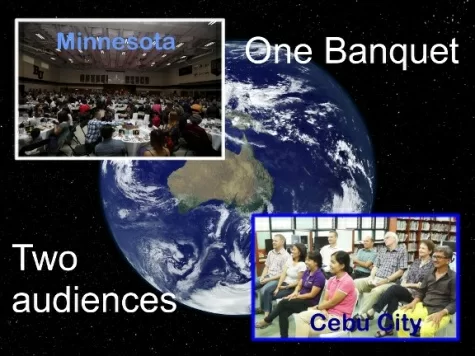 The recent CSC banquet was attended by almost 700 people in Minnesota. On the other side of the world, the staff and workers of CSC were also avid participants. We have a lot of investment in the CSC Annual Banquet. We contribute many hours in helping Matt and Jill prepare, taking pictures, shooting videos and offering suggestions concerning the program. Our workers know how important the banquet is and spend time praying for the event. Even the children of CSC are aware of the timing of the banquet and ask lots of questions about it. They love to see pictures of the banquet and watch the videos that are prepared for showing there.
The recent CSC banquet was attended by almost 700 people in Minnesota. On the other side of the world, the staff and workers of CSC were also avid participants. We have a lot of investment in the CSC Annual Banquet. We contribute many hours in helping Matt and Jill prepare, taking pictures, shooting videos and offering suggestions concerning the program. Our workers know how important the banquet is and spend time praying for the event. Even the children of CSC are aware of the timing of the banquet and ask lots of questions about it. They love to see pictures of the banquet and watch the videos that are prepared for showing there.
The banquet started at 7:30 am on Sunday here in Cebu. but we were up and watching via Skype, thanks to Heidi Erickson who had her computer on their table near the stage at Bethel. We couldn't hear all that well, but it was great fun t0 watch what was going on and get a feel for the love and interest in that room. We are the second audience for the CSC banquet, 10,000 miles away, but very interested and engaged and excited to see what gets accomplished every year. We hold our breath when the banquet offering total is announced because we know first-hand how important that income is to the ministry and get to see every day how it is used for the needs of the children we care for here.
The term "stakeholder" is used a lot these days to describe people who have a financial, emotional or spiritual connection to a ministry or program. Certainly all of us in Cebu are stakeholders of the success of the banquet and all the fundraising and promotional efforts of our stateside ministry. But so are all the supporters and lovers of CSC. In that respect, there are many more than two audiences for the banquet. People all around the world are involved as donors and sponsors. In fact, people other than those attending in Minnesota participate in the offering by designating a gift to be included in the collection taken at the end of the banquet. They are excited to hear of the total, as are those who wait patiently at Bethel for the envelop to reach the emcees hands and be announced. It was $126,000!!
But the banquet is more than just an offering, and our stakeholders get to hear and see what is happening in Cebu. It is a night of fellowship, fun, laughter, tears and thanksgiving. One Minnesota attender said that there was "a lot of energy in the room" at Bethel. I know there was. And there was a lot of energy in the room across the world from Minnesota where we were gathered to watch and experience much of what was going on in that room full of CSC lovers, our fellow stakeholders of God's greatness.
Thanks to all who helped make this a great banquet and a blessing to us here in Cebu.





